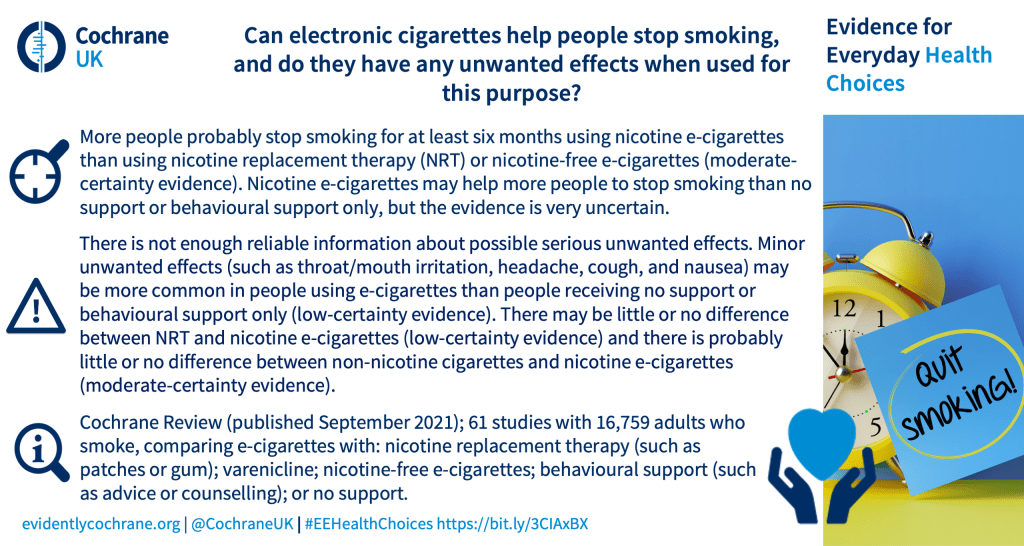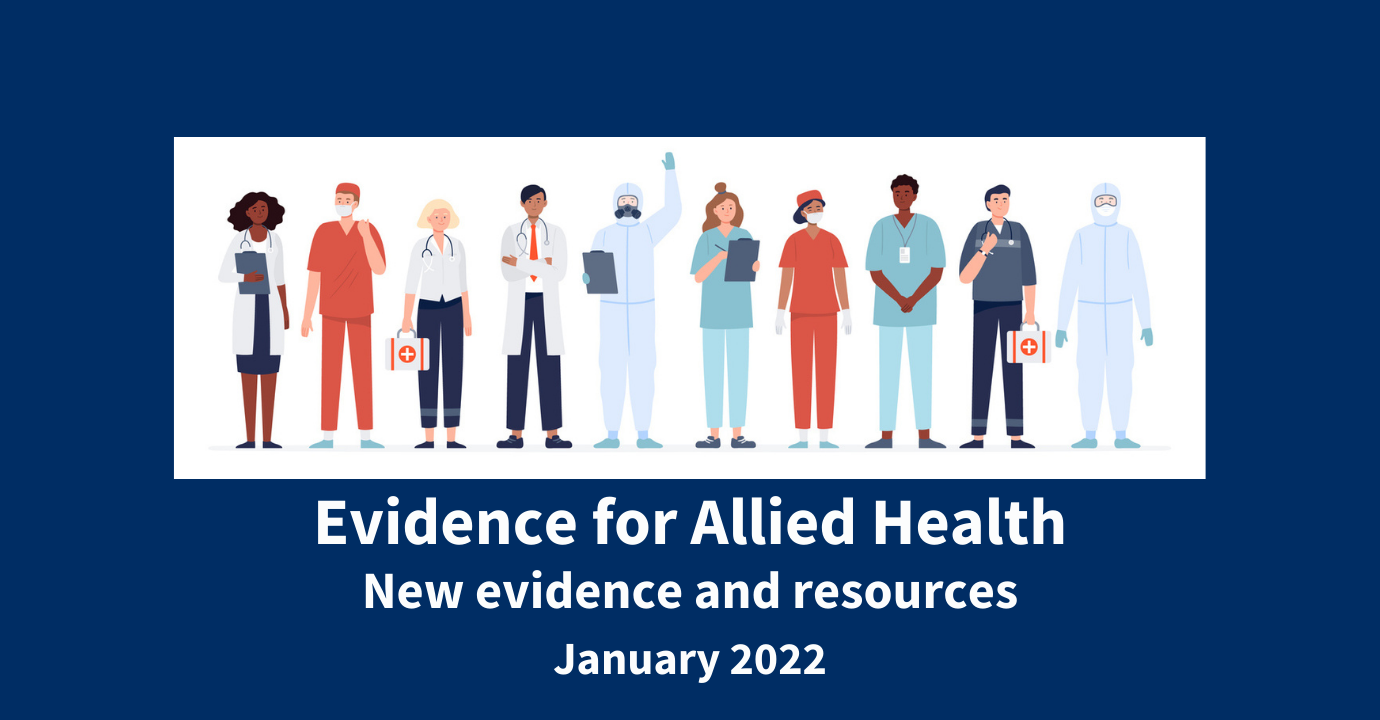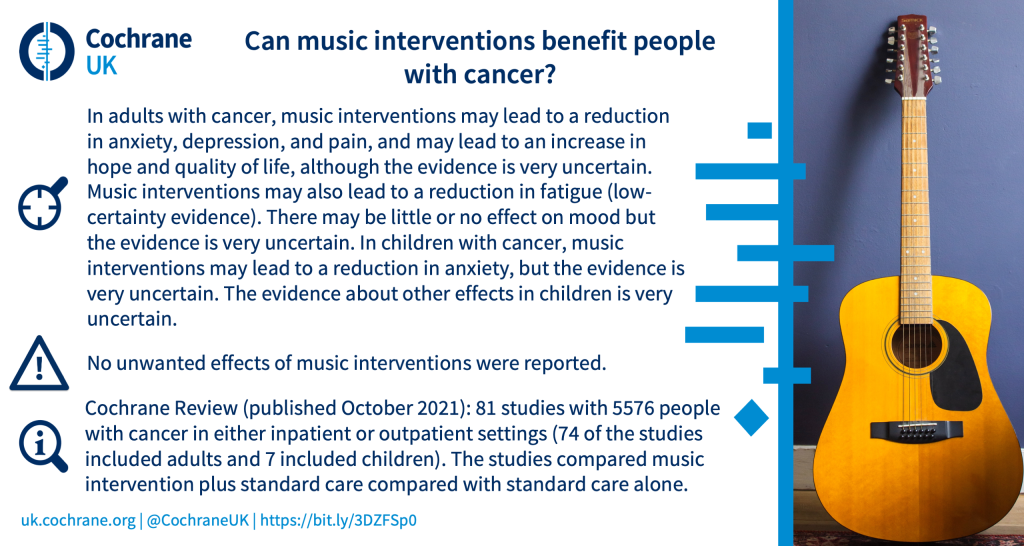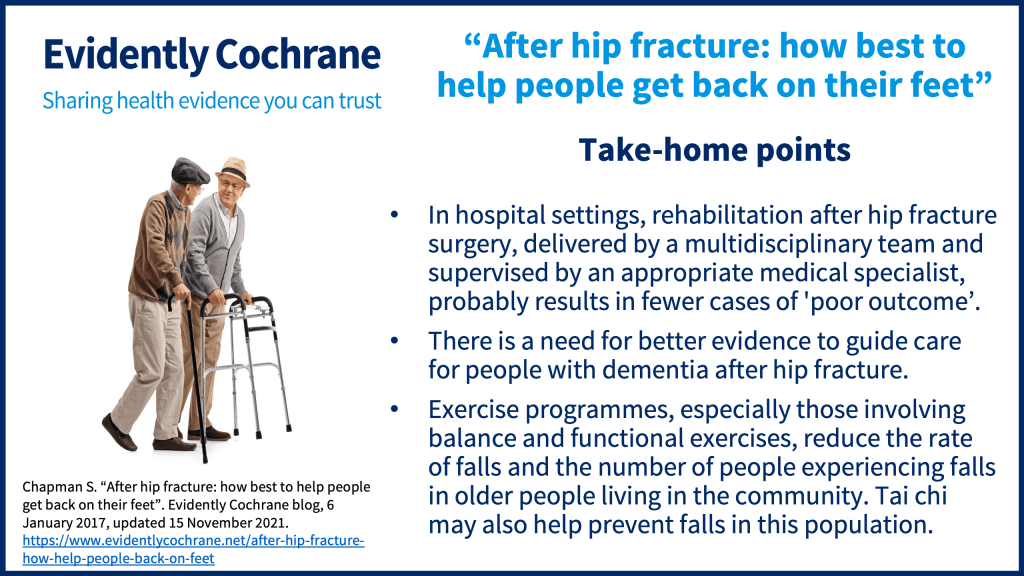The latest evidence and resources for allied health professionals and clinical support staff. You can either scroll through this page or click on any of the links below to jump to the relevant section.
Please note, unlike the rest of our blogs, our ‘Evidence for Allied Health: new evidence and resources’ blogs will not be updated.
- COVID-19
- Cardiac rehabilitation
- Communication for adults with an artificial airway
- COPD
- Delirium prevention
- Dementia
- Dietary salt for people with chronic kidney disease
- Exercise therapy for chronic low back pain
- Life-threatening conditions and emergency care
- Music interventions for people with cancer
- Nutritional supplements for people with non‐alcohol‐related fatty liver disease
- Patient questionnaires
- Rehabilitation after hip fracture
- Smoking cessation
- Stroke
- Vegan diet for primary prevention of cardiovascular disease
- Opportunities and events
.
.
COVID-19
This year, Cochrane is continuing to produce new and updated reviews in response to the pandemic. We have blogged about many of them and this blog COVID-19 evidence: a Cochrane round-up brings together a large collection of evidence and resources, starting from when this evidence was first being produced in spring 2020. Like the reviews themselves, all our blogs are updated to reflect new evidence.
There is a Cochrane news item about Ivermectin: Cochrane’s most talked about review so far, ever. Why?
The impact of measures intended to prevent or reduce the spread of Covid-19 in long-term care facilities have been explored in Non‐pharmacological measures implemented in the setting of long‐term care facilities to prevent SARS‐CoV‐2 infections and their consequences: a rapid review. There is evidence that a number of strategies may reduce the number of infections and related outcomesOutcomes are measures of health (for example quality of life, pain, blood sugar levels) that can be used to assess the effectiveness and safety of a treatment or other intervention (for example a drug, surgery, or exercise). In research, the outcomes considered most important are ‘primary outcomes’ and those considered less important are ‘secondary outcomes’., but more robust evidence is needed. You can read more in the news item Can non-pharmacological measures prevent or reduce Covid-19 (SARS-CoV-2) infections in long term care facilities? and there are a number of related Cochrane Clinical Answers (see reference list).
Cochrane Special Collections
Cochrane Special Collections assemble Cochrane Reviews on important topics for the prevention and treatment of COVID-19. They are developed with experts from our global Cochrane network. They are based on World Health Organization interim guidance, and continuously updated. You can find Coronavirus (COVID-19) Special Collections here.
Cochrane Podcasts
Cochrane COVID-19 Podcasts offer short summaries of Cochrane COVID-19 reviews from the authors themselves. A good way to hear the latest Cochrane evidence in under 5 minutes each.
Cochrane Clinical Answers
Cochrane Clinical Answers (CCAs) provide a readable, digestible, clinically-focused entry point to rigorous research from Cochrane ReviewsCochrane Reviews are systematic reviews. In systematic reviews we search for and summarize studies that answer a specific research question (e.g. is paracetamol effective and safe for treating back pain?). The studies are identified, assessed, and summarized by using a systematic and predefined approach. They inform recommendations for healthcare and research.. They are designed to be actionable and to inform point-of-care decision-making. Each CCA contains a clinical question, a short answer, and data for the outcomes from the Cochrane Review deemed most relevant to practising healthcare professionals.
You can find Cochrane Clinical Answers related to COVID-19 here.
Cardiac rehabilitation
Cochrane Clinical Answer: What are the effects of exercise‐based cardiac rehabilitation for people with coronary heart disease?
Communication for adults with an artificial airway
The Cochrane Review Interventions to enable communication for adult patients requiring an artificial airway with or without mechanical ventilator support (October 2021) has highlighted a lack of evidence to guide practice on choice of communication aid and when to use them.
COPD
ChronicA health condition marked by long duration, by frequent recurrence over a long time, and often by slowly progressing seriousness. For example, rheumatoid arthritis. non‐invasive ventilation
The Cochrane Review Chronic non‐invasive ventilation for chronic obstructive pulmonary disease was published in August 2021. The authors concluded: “Regardless of the timing of initiation, chronic NIV [non-invasive ventilation] improves daytime hypercapnia. In addition, in stable COPD, survival seems to be improved and there might be a short term HRQL [health-related quality of life] benefit. In people with persistent hypercapnia after a COPD exacerbation, chronic NIV might prolong admission‐free survival without a beneficial effect on HRQL.”
Integrated disease management
Cochrane Clinical Answer: What are the effects of integrated disease management (IDM) interventions for people with chronic obstructive pulmonary disease (COPD)?
Delirium prevention
Delirium is common in hospitalised patients. The authors of a Cochrane Review on Non‐pharmacological interventions for preventing delirium in hospitalised non‐ICU patients (November 2021) have concluded:
- “There is moderate‐certainty evidence regarding the benefit of multicomponent non‐pharmacological interventions for the prevention of delirium in hospitalised adults, estimated to reduce incidenceThe number of new occurrences of something in a population over a particular period of time, e.g. the number of cases of a disease in a country over one year. by 43% compared to usual care.
- We found no evidence of an effect on mortalitydeath.
- There is emerging evidence that these interventions may reduce hospital length of stay, with a trend towards reduced delirium duration, although the effect on delirium severity remains uncertain.”
Dementia
- What are the effects of multi‐domain interventions for prevention of dementia and cognitive decline?
- Can palliative care interventions improve outcomes for people with advanced dementia?
Dietary salt for people with chronic kidney disease
The authors of a Cochrane Review Altered dietary salt intake for people with chronic kidney disease (June 2021) found high-certaintyThe certainty (or quality) of evidence is the extent to which we can be confident that what the research tells us about a particular treatment effect is likely to be accurate. Concerns about factors such as bias can reduce the certainty of the evidence. Evidence may be of high certainty; moderate certainty; low certainty or very-low certainty. Cochrane has adopted the GRADE approach (Grading of Recommendations Assessment, Development and Evaluation) for assessing certainty (or quality) of evidence. Find out more here: https://training.cochrane.org/grade-approach evidence that salt reduction reduced blood pressure in people with chronic kidney disease (CKD), and albuminuria in people with earlier stage CKD in the short‐term. They state that “if such reductions could be maintained long‐term, this effect may translate to clinically significantClinical significance is the practical importance of an effect (e.g. a reduction in symptoms); whether it has a real genuine, palpable, noticeable effect on daily life. It is not the same as statistical significance. For instance, showing that a drug lowered the heart rate by an average of 1 beat per minute would not be clinically significant, as it is unlikely to be a big enough effect to be important to patients and healthcare providers. reductions in CKD progression and cardiovascular events. Research into the long‐term effects of sodium‐restricted diet for people with CKD is warranted.”
Cochrane Clinical Answer: What are the effects of altered dietary salt intake for adults with chronic kidney disease?
Exercise therapy for chronic low back pain
- Cochrane Clinical Answer: For people with chronic low back pain, what arethe benefits and harms of exercise therapy?
- Podcast: Exercise for treatment of chronic low back pain.
Life-threatening conditions and emergency care
Cochrane Clinical Answer: What are the benefits and harms of interventions to increase patient and family involvement in the escalation of care for community health and hospital settings?
Music interventions for people with cancer
- The Cochrane Review Music interventions for improving psychological and physical outcomes in people with cancer was updated in 2021.
- It is included in this Evidently Cochrane blog – Bringing harmony to the hospital: music therapies revisited.
- Podcast: Can music interventions benefit people with cancer?
.
.
Nutritional supplements for people with non‐alcohol‐related fatty liver disease
Cochrane Clinical Answer: For people with non‐alcohol‐related fatty liver disease (NAFLD), how do nutritional supplements compare?
Patient questionnaires
Using patient questionnaires for improving clinical management and outcomes – an interview with Cochrane review author Christopher Gibbons about their recent Cochrane Review to find out whether healthcare workers who receive information from questionnaires completed by their patients give better health care and whether their patients have better health.
Rehabilitation after hip fracture
Care and rehabilitation after hip fracture surgery are increasingly in the hands of a multidisciplinary team, and this was explored in a Cochrane Review Multidisciplinary rehabilitation for older people with hip fractures (updated November 2021). There is now evidence that, in hospital settings, rehabilitation after hip fracture surgery delivered by a multidisciplinary team and supervised by an appropriate medical specialist, probably results in fewer cases of ‘poor outcome’. It may also reduce the number of people with poor mobility at 12 months. Its effects (if any) on other outcomes, such as long-term hip-related pain, quality of life, and activities of daily living pain, are uncertain. The impact of supported discharge and multidisciplinary home rehabilitation is also unclear.
Cochrane Clinical Answer: What are the benefits and harms of multidisciplinary rehabilitation (MDR) for older people with hip fracture?
This is one of several reviews included in our blog After hip fracture: how best to help people get back on their feet.
.
.
Smoking cessation
E-cigarettes
The Cochrane Review Electronic cigarettes for smoking cessation was updated in September 2021.
Here is a summary of the review:

Cochrane Clinical Answer: How effective and safe are electronic cigarettes (ECs) for smoking cessation?
Preventing weight gain
- Cochrane Clinical Answer: Does varenicline or nicotine replacement therapy (NRT) help prevent weight gain after smoking cessation?
- Podcast: Interventions for preventing weight gain after smoking cessation.
Stroke
Reducing sedentary behaviour
Cochrane Clinical Answer: For people with stroke, what are the effects of interventions to reduce sedentary behavior?
Screening for dysphagia
A new Cochrane Review Screening for aspiration risk associated with dysphagia in acute stroke has been published and reveals an evidence gap. The authors conclude “we were unable to identify a tool that could accurately identify everyone with food and drink entering their airway, as well as detect all those who definitely did not.”
Vegan diet for primary prevention of cardiovascular disease
Cochrane Clinical Answer: What are the effects of a vegan dietary pattern for primary prevention of cardiovascular disease (CVD)?
Opportunities and events
On this page, Important Cochrane Links, you can find opportunities to get involved, including how to join Cochrane, find volunteer tasks, or jump into the Cochrane Library.
Hundreds of health leaders and experts met on October 14 to recommend the international community urgently mount stronger evidence-based responses to global health emergencies. Recordings from this event are now available on this page: Cochrane Convenes recordings available: the world must learn from pandemic lessons to avoid future catastrophes.
Please note that this page includes a round-up of materials mainly published within the last two months, and is not updated after it’s posted.
Join in the conversation on Twitter with @SarahChapman30 and @CochraneUK or leave a comment on the blog.
Please note, we cannot give medical advice and do not publish comments that link to individual pages requesting donations or to commercial sites, or appear to endorse commercial products. We welcome diverse views and encourage discussion but we ask that comments are respectful and reserve the right to not publish any we consider offensive. Cochrane UK does not fact check – or endorse – readers’ comments, including any treatments mentioned.
Sarah and Selena have nothing to disclose.





This blog provides valuable insights into the latest evidence and resources for allied health professionals. It’s great to see a focus on incorporating evidence-based practices in healthcare. The information shared is relevant and up-to-date, offering a useful resource for those in the allied health field. Well-written and informative, this blog is a must-read for professionals seeking to enhance their knowledge and improve patient care.